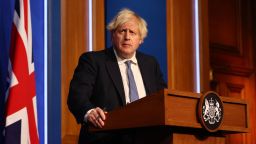It could be a crucial week for Boris Johnson in his battle to stay in power.
The British Prime Minister has been under pressure for weeks over alleged summer garden parties and Christmas gatherings held in Downing Street when the rest of the country was under strict Covid-19 lockdowns. A report into the allegations, set to be released this week, could be the final straw for Johnson’s increasingly mutinous party.
Johnson’s approval ratings are plunging and there appears to be a growing sense among some parts of his ruling Conservative Party that he is becoming a liability. Two polls in the last week suggested that as many as two-thirds of voters want him to resign.
The parliamentary rebellion is growing. One Conservative MP defected to the opposition Labour Party last week and newspapers have reported rumors of more lawmakers demanding Johnson’s exit.
The Prime Minister has given unconvincing answers when asked about the numerous parties. First he said there were none. Once undeniable evidence emerged, he denied knowing about the gatherings. When a photo of him at one such event was published, he insisted he didn’t realize the gathering was a party, claiming he “believed implicitly that this was a work event.”
Johnson was even forced to apologize to the Queen after it emerged that a party was held in Downing Street the night before the funeral of Prince Philip. It was noted at the time that due to Covid-19 restrictions, the Queen was forced to mourn her husband at St. George’s Chapel at Windsor Castle while sitting alone.
Adding fuel to the fire, Johnson’s former senior adviser Dominic Cummings claimed this week he would swear under oath that the Prime Minister was warned about the true nature of one of the drinks parties. Johnson denied that vehemently, saying: “Nobody warned me that it was against the rules… because I would remember that.”
As new “Partygate” allegations emerged, Johnson and his loyalists tried to dismiss them as a “distraction,” steering the conversation away. Johnson has launched an inquiry into the gatherings, led by senior civil servant Sue Gray, whose report is due to come out this week, according to media reports.
Downing Street said on Sunday it had no control over when the report would appear. “It’s not for us to set out when it will be published. That is up to the investigation team,” a spokesperson told CNN.
On Thursday, as more Conservative lawmakers openly criticized the PM about the parties, allegations emerged of blackmail and bullying by government officials.
Conservative MP William Wragg said Thursday that “a number of members of parliament have faced pressures and intimidation from members of the government because of their declared or assumed desire for a vote of confidence in the party leadership of the Prime Minister.”
Wragg told the House of Commons Public Administration and Constitutional Affairs Committee that the reports he has been made aware of “would seem to constitute blackmail.”
Johnson dismissed the reports of bullying, saying he has “seen no evidence” to support accusations of intimidation leveled at his government by a Conservative lawmaker.
Under Conservative party rules, if MPs want to get rid of their leader, they submit a confidential letter of no confidence to the chair of the 1922 Committee, a group of backbench MPs who do not hold government posts. The process is murky – the letters are kept secret and the chairman, Graham Brady, doesn’t even reveal how many have been handed in.
When 15% of Conservative lawmakers have submitted letters, it triggers a vote of confidence among all Conservative lawmakers.
CNN’s Luke McGee, Lauren Kent, Duarte Mendonca, Richard Allen Greene, Robert Iddiols and Sharon Braithwaite contributed to this report.






















